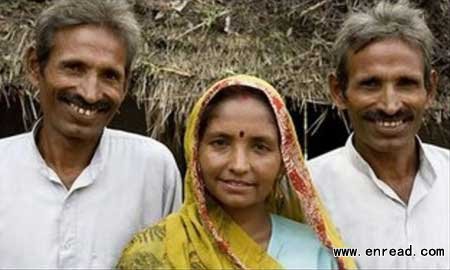| ||||||||||||||||||||||||||||||||||||||||||||||||||||||||||||||||||||||||
|
When Munni arrived in this fertile, sugarcane-growing region of north India as a young bride years ago, little did she imagine she would be forced into having sex and bearing children with her husband's two brothers who had failed to find wives. 若干年前,当年轻的穆尼嫁到印度北部这片富饶的甘蔗盛产区时,她从未想到自己的丈夫会和两个娶不到老婆的兄弟“共妻”,并生养子女。  Aid workers say the practice of female feticide has flourished among several communities across the country. "They took me whenever they wanted -- day or night. When I resisted, they beat me with anything at hand," said Munni, who had managed to leave her home after three months only on the pretext1 of(以……为借口) visiting a doctor. "Sometimes they threw me out and made me sleep outside or they poured kerosene2(煤油) over me and burned me." Such cases are rarely reported to police because women in these communities are seldom allowed outside the home unaccompanied, and the crimes carry deep stigma3 for the victims. So there may be many more women like Munni in the mud-hut villages of the area. Munni, who has three sons from her husband and his brothers, has not filed a police complaint either. Social workers say decades of aborting4 female babies in a deeply patriarchal(家长的) culture has led to a decline in the population of women in some parts of India, like Baghpat, and in turn has resulted in rising incidents of rape5, human trafficking and the emergence6 of "wife-sharing" amongst brothers. Aid workers say the practice of female feticide(堕胎) has flourished among several communities across the country because of a traditional preference for sons, who are seen as old-age security. "We are already seeing the terrible impacts of falling numbers of females in some communities," says Bhagyashri Dengle, executive director of children's charity Plan India. "We have to take this as a warning sign and we have to do something about it or we'll have a situation where women will constantly be at risk of kidnap, rape and much, much worse." According to India's 2011 census7, there are only 858 women to every 1,000 men in Baghpat district, compared to the national sex ratio of 940. Child sex ratios in Baghpat are even more skewed(歪斜的) and on the decline with 837 girls in 2011 compared to 850 in 2001. "In every village, there are at least five or six bachelors who can't find a wife. In some, there are up to three or four unmarried men in one family. It's a serious problem," says Shri Chand, 75, a retired8 police constable9. 点击  收听单词发音 收听单词发音
|
||||||||||||||||||||||||||||||||||||||||||||||||||||||||||||||||||||||||
上一篇:美国多所学习取消万圣节庆祝活动 下一篇:卡梅伦:英国船只可配备武器抵御海盗 |
||||||||||||||||||||||||||||||||||||||||||||||||||||||||||||||||||||||||
- 发表评论
-
- 最新评论 进入详细评论页>>



